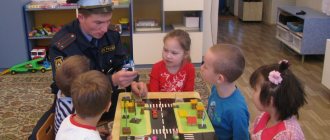Feedback on an extracurricular activity Game-trip “The World Around Us.”
Feedback on an extracurricular activity
Travel game “The World Around Us”.
An open event within the framework of the class teacher education was held by a primary school teacher....
The teacher clearly formulated the goals and objectives that needed to be realized during this extracurricular activity. The course of the event was based on a conversation with students, based on their knowledge gained in lessons about the world around them, as well as taking into account personal experience. On each page, children were asked to complete a task, which interested the students. They completed them with pleasure and completed them in full. The children actively participated in the discussion, asked questions, gave interesting examples, made conclusions and generalizations, and expressed their thoughts about what they heard.
To add a fascinating character and activate the cognitive activity of students, the teacher used the following methodological techniques: telling interesting facts related to the topic under discussion, musical arrangement of the event, work in groups, work in pairs, riddles, reading poetry, games, proverbs and sayings, colorful pictures on the board, presentation. The change in activities had a positive effect on the students; they did not feel tired, the children worked actively and with great desire. A game was played that aroused keen interest among the children.
The students took the event itself and the tasks that were offered to them very seriously. During the event, the teacher fully realized the goals and objectives set initially.
…. carefully prepares for each event and they are all held at a high level.
Thank you to the class teacher for a wonderful event....
Head of the MO of class teachers:
Feedback to primary school teacher Z.S. Kurbatova
Kurbatova Zinira Safiullovna
a good teacher, dedicated to his work. She is always looking for new means and forms of teaching and educating younger schoolchildren, full of strength, energy, and creative ideas. Zinira Safiullovna effectively uses the latest pedagogical technologies in the educational process, skillfully uses creative work in educational and extracurricular activities. In her lessons, everything is thought out to the smallest detail, one task is replaced by another, and each requires children not just to perform mechanically, but forces them to think, compare, contrast, and draw conclusions. She has a favorable psychological climate in her class. From the very first day of school, he instills in his students respect for work, honesty and human dignity, the need for knowledge, the ability and desire to independently overcome difficulties, and bring the work started to the end. Its students take an active part in all school events, participate and win prizes in regional and zonal competitions and olympiads.
In the team he enjoys authority among his colleagues. I wish further creative success to Zinira Safiullovna.
Head of the educational organization of teachers of the “Special Child” class E.S. Gorskaya.
Feedback on the open class hour “Family”
Teacher: Kurbatova Z.S.
One of the current topics of classroom hours in primary schools is the topic of moral education of students. Zinira Safiullovna has developed a program of extracurricular activities for moral education. Implements the program through various events: conversations, classes, games, competitions. At the open class hour “Family,” the goal was set: to develop in children love and respect for loved ones, a caring attitude towards family values and traditions. The teacher clearly formulated the goals and objectives that needed to be realized during this extracurricular activity. During the event, to make it exciting and enhance the cognitive activity of students, I used the following methodological techniques: telling interesting facts related to the topic under discussion, musical arrangement of the event, work in groups, colorful and meaningful presentation.
The analysis of the material was carried out very emotionally and enthusiastically, which undoubtedly affected the interest of the students. The guys enthusiastically talked about their family, about family traditions, and performed various tasks: in groups, frontally, and individually. Zinira Safiullovna communicated with the guys tactfully, showing respect for each student.
An interesting physical education session was held, although the children did not show any fatigue, they were keen on the course of the event.
At the end of the event, results were summed up regarding the completeness of the implementation of the set goals. The class hour was interesting and effective.
Head of the Moscow Class Teachers' Department E.F. Dautova
What was planned for 2020
In January of this year, we published a large material about the upcoming launch of the National Teacher Development System (NTTS).
For teachers, this meant, first of all, the introduction of new positions and changes in the rules for conducting periodic certification. Thus, the system included the Unified Federal Assessment Materials (EFOM). According to the logic of the authors of the new concept, teachers throughout Russia could be certified according to uniform rules
, which was supposed to put all teachers on equal terms.
The most important thing is that the new system should have been implemented in 2020. Thus, testing of a new teacher certification model was supposed to continue until June, then until November it was planned to study the level of qualifications of Russian teachers and create a unified database about them.
According to the new model, teacher evaluation should take place in several stages:
- testing knowledge in your subject. It is expected that there will be several blocks - tests on the subject, searching for errors in the student’s speech, drawing up a lesson plan, etc.;
- solution to a pedagogy case. This is an analysis of the real situation in schooling, and a complex situation at that;
- analysis of the teacher's work in practice. This was supposed to be the most difficult block - they wanted to evaluate teachers based on a video recording of the lesson (or part of it), as well as a lesson plan and samples of student test work. But at the beginning of the year there was information that there would be no need to make a video recording of the lesson;
- assessing the success of a teacher as a specialist. In this block they wanted to evaluate the success of graduates (later this part was abandoned), the individual achievements of the teacher, the conditions of his professional activity
The teacher had to pass all this in the first year of work (“entry into the profession”), then after 3 years, then after 5 years, etc.
Read also: Benefits for children from 3 to 7 years old will increase to the subsistence level. But not for everyone 6
But these are not just scheduled exams; after each stage, teachers must be promoted
– from junior specialist to teacher-mentor, which was also presented as part of the new teacher evaluation system.
However, apparently, the launch of the new model is postponed
.
What definitely won't happen in the new school year
There is still little information about the postponement of the implementation of the new system. For example, the order of the Ministry of Education on the approval of the “road map” for the introduction of the NSSD has not changed - in reference systems it is displayed as valid, but the dates in it are the same (that is, by November 2020 a database with data on teachers’ competencies must be created.
The desire of officials to quickly implement the new system is also confirmed by the fact that in April of this year (when all schools were already closed and transferred to distance learning), deputy State Duma committee deputy Lyubov Dukhanina criticized the current certification system
– according to the ONF, only 17% of teachers believe that its results are objective.
But soon the Ministry of Education issued an order extending the validity of teacher certification. This applies to those whose certification expires from April 1 to September 1, 2020 - for them the period has been extended until December 31
. But this was done only to ensure that teachers with expiring certification did not lose additional payments for the category while they were unable to pass it due to quarantine measures.
On the other hand, if the certification period expires in 2020, then you will have to go through it - but what will happen to the new rules, the EFOM and the NSUR?
The only thing that is already known is that the deadline for introducing new qualification categories has been postponed to September 1, 2021
. Considering that the new certification system was “tailored” specifically for new positions (everything should work according to a new unified scheme), it is likely that the new rules for evaluating teachers will also be postponed for a year.
True, there are no official documents about this, but Minister of Education Sergei Kravtsov said that in September 2021, testing of a new system for certifying teachers in schools and the introduction of new positions will begin
.
That is, with a high degree of probability, teachers will be certified in the 2020-2021 academic year according to the old rules. Some people like them, some don’t, but at least they are known and understood - so most teachers will probably approve of even such a postponement (although many generally speak out against the new system as a whole).
But there is something new: if now the professional development system includes the levels of a young specialist, a teacher of the first category and a teacher of the highest category, then from 2021 it will be this gradation
:
Read also: Benefits for children from 3 to 7 years old will increase to the subsistence level. But not for everyone 6
- teacher;
- senior teacher (teacher-methodologist);
- leading teacher (teacher-mentor).
To move from a teacher position to a senior teacher position, you will need to work for a minimum of 5 years
at school, and for a teacher-mentor -
10 years
. A new certification format is also being introduced - for compliance with a professional standard. It was promised to be introduced in 2020, but now it is likely to be postponed until at least next year.
Thus, what many teachers feared, although not canceled completely, is postponed for now - at least for a year
.
Review of an extracurricular event on the topic: “The right of citizens to choose”
Review
for an open extracurricular event
"The right of citizens to choose"
as part of the professional competition “Educate a Person-2018”
Grade: 4, age: 10 years
Composition of the student group: 15 students
Form of work: frontal, steam room, individual
The purpose of the event: to increase the level of legal literacy and political culture of junior schoolchildren.
The extracurricular event “Citizens' Right to Choose” was held in the form of a business game as part of the educational program of the civic and patriotic direction “We are Russians.”
This form of conducting classes helps to reveal the personal qualities of children, promotes the creation of an atmosphere of mutual understanding, creativity, and the manifestation of emotionality. The content of the lesson is based on the life experience of students, on the characteristic features of primary school age, where one of the leading activities is communication.
The choice of topic for the lesson is very relevant, since today the sense of citizenship and patriotism is being seriously tested. The Fatherland has changed, its past is being revised, the present is disturbing and the future is seriously alarming with its uncertainty. The feeling of patriotism is multifaceted in its content: it is love for one’s native places, and pride in one’s people, and the desire to preserve and increase the wealth of one’s country.
When planning and conducting this lesson, the teacher set himself the following tasks:
Tasks:
— to acquaint students at a level accessible to them with the principles and objectives of holding elections;
— to form motivation and cognitive interest in the norms of electoral law, the principles of democracy and elections, the legal and constitutional foundations of the Russian Federation;
- expand the horizons of students, give the concepts: “election program”, “ballot”, “ballot box”, “booth”, “candidate”;
- develop the ability to generalize, draw conclusions, argue one’s own point of view, develop monologue speech;
-consider the role of personality in shaping life and destiny;
- foster citizenship and responsibility
To achieve the goal, the following stages of the lesson were used:
- Organizational start of the lesson, the main goal of which was the psychological preparation of students for communication in class.
- At the second stage, the task was set: “Update previous knowledge, skills and abilities directly related to the topic of the lesson; preparing students to work on the topic of the lesson.”
- At the third stage, the task was set: “Formulate the topic of the lesson for the children themselves.” At this stage, a rebus is used, a selection of synonyms for the word “Motherland” and filling in the grid of the word with letters. This helped the children determine the topic and goals of the lesson. The technique of system-activity technology “Finish the sentence” was used; this moment can also be identified as an interdisciplinary connection.
- At the fourth stage, the task was: “Determining the level of children’s knowledge on a given topic.”
To achieve these tasks, the teacher used a presentation, work with a legal dictionary, work on drawing up proposals about the basic duty of a citizen and his right to participate in elections; To clarify the meaning of the words “booth, ballot box, ballot,” students worked frontally.
- At the fifth stage, the technique of modeling the process of elections and decision-making by citizens when voting, acquiring skills in filling out ballot papers was used. Compiling the panel “I, you, he, she – the whole country votes!”
- At subsequent stages, the children summed up their activities and answered the question “Where can they apply the knowledge they have acquired?”
Throughout the lesson, different forms of work were used to enhance cognitive activity: frontal, individual, pair;
methods: verbal (conversation, concepts), visual (video, presentation), practical problem-search, reflection. The following technologies were used: person-oriented, activity-based approach, RCM technology.
During the event it was possible
solve the main problem: create conditions that ensure the development of UUD.
Personal UUD:
Organize your own activities, choose and use means to achieve its goals;
Actively engage in communication and interaction on the principles of respect and goodwill;
Show positive personality traits and manage your emotions in various situations and conditions;
Cultivate your own sense of patriotism, pride in your homeland.
Regulatory UUD:
Convey information in an accessible, emotionally vivid form;
Independently regulate the degree of attention in any game situation;
Organize your own play activities;
Manage emotions when communicating with peers and adults, maintain restraint and prudence;
Technically correctly perform actions in gaming activities.
Cognitive UUD:
Characterize phenomena, actions and actions, give them an objective assessment based on acquired knowledge and existing experience;
Be able to use information;
Find a way out of the current situation.
Communication UUD:
Actively participate in collective activities, interact with peers in achieving common goals;
Be able to hear and engage in dialogue;
Be able to speak in public;
Provide friendly support.
During the lesson, the main emphasis was on life examples, which gave the lesson an emotional tone and specificity.
The psychological atmosphere was trusting, emotional, and friendly. The guys worked with pleasure.
During the class hour, the methodological principle was observed - communication.
Conclusion:
In general, the event was successful: the students were active, disciplined, and took the assignments seriously. The topic of the event was relevant, the presentation and visual aids used corresponded to aesthetic standards and the age characteristics of the students.
The goal of the lesson was achieved.
Deputy Director for HR Yu.I. Kezlya





